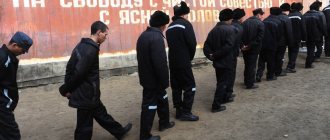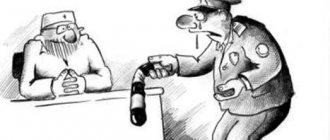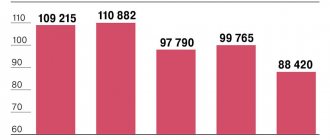A suspended sentence as a mitigating measure is applied by the judiciary in cases where the possibility of correcting a convicted person outside the place of imprisonment has been established, if the crime committed does not fall into the category of categories of offenses prohibited for replacing real imprisonment with suspended sentences.
Multi-channel free hotline Legal advice on criminal law. Every day from 9.00 to 21.00
Moscow and region: +7 (495) 662-44-36
St. Petersburg: +7 (812) 449-43-40
The procedure for assigning a suspended sentence
Conditional sentencing is the right of the court, but only in the manner and in cases provided for by the Criminal Code of the Russian Federation. The basis for this is to establish the possibility of correcting a convicted person without applying real punishment.
The set of conditions under which a suspended sentence may be imposed:
- As a real punishment, the court decided to impose imprisonment for up to 8 years, correctional labor, restrictions on military service, or detention in a disciplinary unit.
- The convicted person is not subject to restrictions for probation, which are:
- committing a sexual offense against a minor (under 14 years of age);
- committing a crime under Part. 1 and 2 tbsp. 205.1, Art. 205.2, part 2 art. 205.4 (terrorism), part. 1-3 Article 206 (hostage taking), Art. 360 of the Criminal Code of the Russian Federation (attack on persons and organizations under international protection);
- committing a serious or especially serious crime during the probationary period of a previously assigned conditional sentence for any intentional crime;
- committing a serious or especially serious crime during the unserved part of the sentence for an intentional crime while on parole;
- dangerous/especially dangerous relapse.
- The nature and degree of danger of the crime committed, the identity of the convicted person, and the mitigating and aggravating circumstances available in the case allow the application of a conditional sentence (evaluation criterion).
As a rule, the court goes for a conditional sentence if there are no restrictions for this, and the convicted person has a positive character, has made amends for the cause of harm and has other mitigating circumstances. On the other hand, even one aggravating circumstance is enough to prevent the court from agreeing to this. In general, too many evaluative factors, and sometimes subjective assessments, underlie the court’s adoption of a particular decision. In the vast majority of cases, those defendants who face real imprisonment are fighting for a suspended sentence.
The decision on a suspended sentence is made by the court along with the decision of other issues when preparing a guilty verdict. It is included in the text of the sentence and announced along with it.
Types (conditionally imposed punishments)
When imposing certain punishments, it is possible to replace a person’s imprisonment with a suspended sentence. Scroll:
- correctional work, regardless of its duration;
- restrictions related to the armed forces (correctional work intended for contract soldiers);
- imprisonment (if the sentence for the criminal act is no more than 8 years);
- being in a disciplinary military unit is an analogue of imprisonment, but only for persons undergoing military service under a contract or on an urgent basis.
If the judge can apply the norm of Art. 73 of the Criminal Code of the Russian Federation for conditional imprisonment, this does not mean that in reality he will definitely do this. This is the authority given to him by the Criminal Code of the Russian Federation. But the judge is not required to do this. The use of a suspended sentence must be motivated. This is the result of an analysis of the personality of the criminal, his character, and the danger of the illegal act for society.
If the verdict of a judicial authority contains a condition that a person is released conditionally, this does not mean that the person is thereby released from correctional labor or imprisonment. The application of a suspended sentence cannot be equated with release from punishment.
The law prescribes the grounds on which a person who has been convicted is exempt from serving his sentence:
- he served his sentence;
- revocation of sentence;
- parole;
- mitigation of punishment;
- act of pardoning a convicted person;
- holding amnesties;
- serious illness.
Consequences of probation
When assigning a suspended sentence, the court determines a probationary period for the convicted person. During this period it is necessary:
- go to the “check-ins” with the inspector of the criminal-executive inspection (CII);
- comply with court-ordered restrictions;
- prove your correction in every possible way, for example, get a job, not commit administrative offenses, receive positive references from places of work and residence.
The probationary period is:
- From 6 months to 3 years – when a sentence of imprisonment of up to 1 year is imposed or a more lenient punishment is imposed than imprisonment.
- From 6 months to 5 years – with imprisonment for a term of more than 1 year.
- Within the period of military service remaining on the day the verdict was announced - when imposing a sentence in the form of detention in a disciplinary unit.
The specific period is determined by the court. As a rule, it depends on the severity of the crime committed, its nature and consequences. The personality of the convicted person and his characteristics must also be taken into account. The period is calculated from the moment the sentence enters into force, but the period of time from the announcement of the sentence to its entry into force is subsequently counted towards the probationary period.
Replacing a real punishment with a conditional one does not prevent the imposition of additional punishments, for example, a fine. Additional sentences are served independently. True, the course of their serving and the results, as a rule, affect the assessment of the behavior of the convicted person - whether he is corrected or not.
What restrictions can a court determine for a person along with a suspended sentence:
- prohibition on changing permanent place of residence, place of study and (or) work without notifying the inspector of the Penitentiary Institution;
- ban on visiting certain places;
- the obligation to undergo a certain course of treatment (for alcoholics, drug addicts, substance abusers or people suffering from a sexually transmitted disease);
- obligation to work (get a job);
- obligation to continue learning.
Many people are interested in whether it is possible to travel abroad during the probationary period and, in general, a suspended sentence? Firstly, the court has the right to impose such a restriction, since the list is not exhaustive. The law allows you to establish other prohibitions, restrictions and obligations not specified in the Criminal Code of the Russian Federation. Secondly, traveling abroad if you have a criminal record and, especially, while serving a sentence, will most likely be in question in itself. If there are no such restrictions, then traveling abroad will still need to be agreed upon with the UII inspector. Otherwise, this may be perceived as an attempt to hide or evade the mark in the UII.
Established restrictions and obligations may be canceled, changed or supplemented by the court during the probationary period. To do this, it is enough for the inspector of the Inspectorate to make a corresponding submission to the court.
What does the court consider when making a sentence?
A suspended sentence is a court sentence. It does not bind a person to imprisonment. According to the Criminal Code of the Russian Federation, conditional sentences can only be basic. In Art. 73, part 1 contains a list of punishments applied as suspended sentences. The list is exhausted.
What is the judge guided by when assigning such a punishment? In his opinion, a citizen can reform without imprisonment being applied to him in reality. Therefore, if the period of punishment for committing an unlawful act is up to eight years, then the judge can use a suspended sentence.
Serving probation
The suspended sentence is served at the place of permanent residence . The convicted person must register with the local penal inspection and regularly visit the inspector. Where to report for a suspended sentence - this question can be clarified on the website of your regional Federal Penitentiary Service, finding there a list, addresses, and work schedule of penal inspections. As a rule, they operate at the local (city, district) level, some at the inter-district level.
The procedure for serving a suspended sentence is determined by the court, as well as Art. 188 Penal Code of the Russian Federation. The correctional institutes keep personal records of convicts, monitor their behavior and fulfillment of the duties imposed by the court. Convicts are required to appear when called by the inspector, attend inspections, report to the inspector about their behavior, and compensate for the damage caused by the crime, which is determined by the sentence. The frequency of marks may be established by the court. If this has not been done, the schedule is determined by the inspector. The convicted person is obliged to comply with it. If he does not show up for the appointment, measures will be taken to establish his whereabouts, determine the reasons for his failure to appear, and, possibly, bring him to justice.
Violation of established duties by a convicted person for the first time entails a written warning. Further, it is possible to cancel the suspended sentence.
Control is removed as soon as the probationary period has expired.
Commentary to Art. 73 of the Criminal Code of the Russian Federation
The latest version of the criminal law clearly defines what a suspended sentence is.
In addition, the legislator has determined that only its main types can be replaced with a conditional form of punishment. If the court is considering the possibility of correcting a person who has committed several crimes without serving a real sentence, it has the right to establish a suspended sentence based on the sum of the terms for all the offenses considered in court in the aggregate.
The following types of criminal sanctions cannot be replaced by a suspended sentence:
- fine;
- compulsory work activity;
- deprivation of the opportunity to carry out a certain type of activity;
- deprivation of the opportunity to occupy certain positions.
When the court makes a decision to replace the term with a suspended sentence, it is necessary to indicate the justified reasons for the decision.
The regulatory framework of court decisions allows us to establish that decisions on choosing an alternative measure of responsibility are made by judges for all categories of criminal offenses. This takes into account the fairness of the relationship between the action committed and the punishment imposed and the real chances of complete correction of the person in order to prevent him from committing new crimes.
If a person on probation violates the rules of conduct established by the court, the supervisory and control body has the right to submit to the court a proposal to increase the probation period or to include additional duties of the convicted person. The court may increase or decrease the terms and add or remove some duties. The court does not have the right to supplement the authority’s requirements with its own options.
Consequences
There are favorable and unfavorable consequences of probation, which are specified in the legal legislation.
The following provisions are highlighted:
- The ability of the accused to avoid imprisonment for a certain period, as well as the expungement of a criminal record ahead of schedule. In this case, the main punishment is not subject to execution, and after the probationary period the person is recognized as not having been convicted.
- Serving a full sentence after systematic violations, evasion of fines and administrative penalties.
- Serving the full sentence in case of violation of the conditions of probation, evasion of educational influence and control in the case where the accused was transferred for correction to a public organization or work collective.
- Serving the sentence in full, which occurs after the fact of a new crime during the probationary period.
A suspended sentence has a criminal legal nature, the main purpose of which is to reform the accused during the probationary period.
The accused is assigned various orders: correctional labor, imprisonment, restrictions on the type of activity, position held, or imprisonment in a military unit. These provisions also apply to minors .
The revocation of a suspended sentence is carried out on the prescribed grounds established by the Criminal Code . The maximum conditional penalty period does not exceed the three-year mark .
Probation
A probationary period for a suspended sentence (hereinafter referred to as IP) is a period of time established by court during which the accused has the right to reform.
The minimum term is 6 months , the maximum term of suspended sentence is 3 years . At the end of the period, the criminal record can be expunged (if the requirements are implemented).
Key points:
- The IP is recorded in the conviction.
- The length of the period is determined individually.
- The countdown begins immediately after the verdict comes into force.
- The IP is extended if the accused evades duties or commits violations of law and order and is subject to administrative liability.
Examples of suspended sentence terms in criminal law:
- from 1 to 3 years - it is not allowed to occupy a specific position/certain practice (activity);
- from 6 months to 2 years - test work;
- from 6 months to 2 years - service restrictions, etc.
Restrictions for a probationer
There is a whole list of restrictions, and they are as follows:
- Determining the time period when a person cannot leave his home.
- Restrictions on visiting places of entertainment.
- Determination of the place of residence of the sentenced person and a ban on leaving a certain geographical area.
- Completing mandatory social activities: study, social activities, work.
Cancellation of probation
Cancellation occurs in two ways:
- The convicts have undergone correction.
- The need to replace the suspended sentence with a real one.
In addition, the law does not prohibit the cancellation of a suspended sentence early. This is a kind of encouragement for a person. This measure is possible subject to a number of conditions:
- At least half of the probationary period has passed.
- The convict proved that he had reformed. He compensated for the damage caused as a result of the crime he committed. Moreover, it matters if the damage is repaid by half.
- At the same time, the issue of expunging a person’s criminal record is resolved.
There is also a sadder development of events. It consists in the fact that the conditional punishment is replaced by a real one. There are also conditions for this:
- systematic evasion of compensation for harm;
- regular violation of the duties imposed on him by the court;
- evasion of compensation for damage caused as a result of the crime committed;
- repeated violation of public order, bringing a person to administrative responsibility;
- the convict left the geographical zone, thereby escaping the control of the curator;
- commission by the convicted person of a crime that is classified as especially grave.
Extension of probationary period
This is allowed once, for a period not exceeding 12 months. An extension is allowed in relation to a conditionally convicted citizen if:
- He does not comply with the requirements of the employee who supervises him. And this is not the first time he has done this.
- The conditionally convicted person left the place specified by his registration.
- He did not comply with the restrictions imposed on him by the court.
- He violates the deadlines for visiting a supervisory authority employee to make notes on the regime of serving the sentence.
Replacement with real punishment
The law fights for a suspended citizen to the last possible extent. Replacement for a real period occurs if there is no hope that the person will improve. For example, he did not fulfill the duties assigned to him by the court. Or he hid from his curator, although he knew that this should not be done. In this situation, the court makes a decision that the suspended sentence is replaced by a real term of imprisonment.
But before doing this, the curator, represented by the inspectorate, submits a petition to the court to extend the trial period.
The convicted person is informed about this. And only then, if this measure does not have its effect, the conditional release is cancelled. Order a free legal consultation
To whom it is not assigned
The court may not always impose a suspended sentence. This is the right of a judge: the law cannot oblige an official to release citizens on conditional release. And the judge is also bound by a number of restrictions under which a suspended sentence cannot be imposed:
- Sexual offense based on the immunity of a citizen recognized as a minor.
- Crimes provided for in certain articles of the Criminal Code of the Russian Federation.
- Relapse.
- Committing an offense that, by its category, is classified as grave or especially grave.







